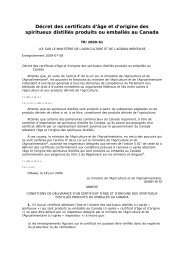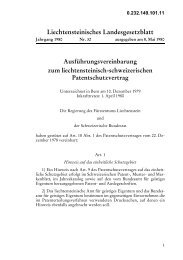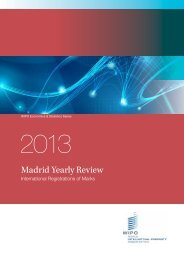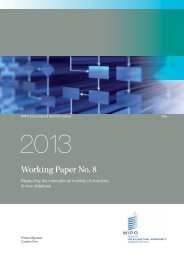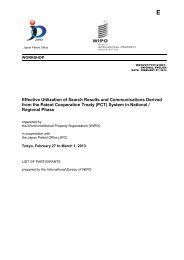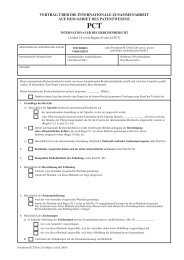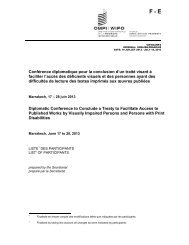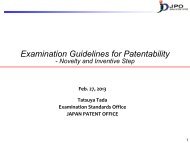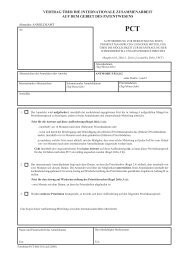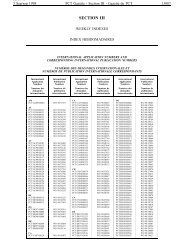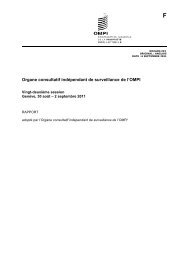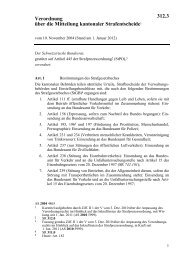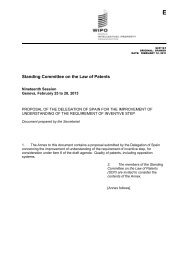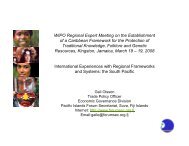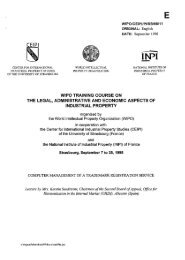PCT Yearly Review - WIPO
PCT Yearly Review - WIPO
PCT Yearly Review - WIPO
Create successful ePaper yourself
Turn your PDF publications into a flip-book with our unique Google optimized e-Paper software.
Annexes<br />
2. the establishment of an ISR and a written opinion<br />
by an ISA;<br />
3. the publication of the <strong>PCT</strong> application and related<br />
documents, as well as their communication to designated<br />
and elected offices by the IB;<br />
4. the optional establishment of an SISR by a SISA; and<br />
5. the optional establishment of an IPRP by an IPEA.<br />
National Phase Entry (NPE): The entry of a <strong>PCT</strong> application<br />
into the national phase before a national or<br />
regional patent office. National phase entry involves the<br />
payment of fees and, where necessary, the submission<br />
of a translation of the <strong>PCT</strong> application. It must take place<br />
within 30 months from the priority date of the application,<br />
although longer time periods are allowed by some offices.<br />
International Preliminary Examining Authority (IPEA):<br />
A national or regional patent office appointed by the<br />
<strong>PCT</strong> Assembly to carry out international preliminary<br />
examination. Its task is to establish the IPRP (Chapter<br />
II of the <strong>PCT</strong>).<br />
National Phase under the <strong>PCT</strong>: Following the <strong>PCT</strong><br />
international phase, the national phase consists of the<br />
processing of the application before each national or<br />
regional patent office in which the applicant seeks protection<br />
for an invention.<br />
International Preliminary Report on Patentability<br />
(Chapter II of the <strong>PCT</strong>) (IPRP): A preliminary, non-binding<br />
opinion, established by an IPEA at the request of the<br />
applicant, on whether the claimed invention appears to<br />
be novel, to involve an inventive step (to be non-obvious)<br />
and to be industrially applicable. Prior to January 1, 2004,<br />
this report was known as the “International Preliminary<br />
Examination Report”.<br />
International Search Report (ISR): A report established<br />
by an ISA containing citations of documents (prior art)<br />
considered to be relevant for determining, in particular,<br />
the novelty and inventive step of the invention as claimed.<br />
The ISR also includes the classification of the subject<br />
matter of the invention and an indication of the fields<br />
searched as well as any electronic databases searched.<br />
International Searching Authority (ISA): A national<br />
patent office or intergovernmental organization appointed<br />
by the <strong>PCT</strong> Assembly to carry out international<br />
searches. ISAs establish ISRs and written opinions on<br />
<strong>PCT</strong> applications.<br />
Invention: A new solution to a technical problem. To<br />
obtain patent rights an invention must be novel, involve<br />
an inventive step and be industrially applicable, as judged<br />
by a person skilled in the art.<br />
Non-Resident Filing: For statistical purposes, a patent<br />
application filed with a national patent office by an<br />
applicant from a foreign country. For example, a patent<br />
application filed with the USPTO by an applicant residing<br />
in France is considered a non-resident filing from<br />
the perspective of the US. A “non-resident filing” is the<br />
opposite of a “filing abroad”, which describes a patent<br />
application filed by the resident of a given country with<br />
a foreign patent office from the perspective of the applicant’s<br />
origin. A “non-resident filing” is also known as<br />
a “foreign filing”.<br />
Paris Convention: An international convention (the Paris<br />
Convention for the Protection of Industrial Property)<br />
signed in Paris, France, on March 20, 1883, it is one<br />
of the first and most important intellectual property (IP)<br />
treaties. The Paris Convention establishes, among other<br />
things, the “right of priority” principle, which enables a<br />
patent applicant to claim a priority of up to 12 months<br />
when filing an application in countries other than the<br />
original country of filing.<br />
Patent: An exclusive right granted by law to an applicant<br />
for an invention for a limited period of time (generally 20<br />
years from the time of filing). The patent holder has the<br />
exclusive right to commercially exploit the invention for<br />
the duration of the patent term. In return, the applicant is<br />
obliged to disclose the invention to the public in a man-<br />
92



